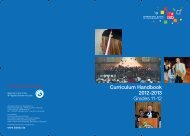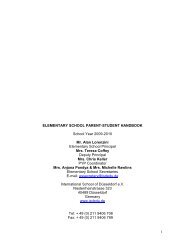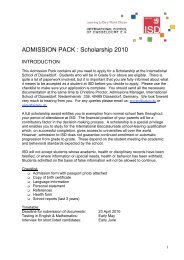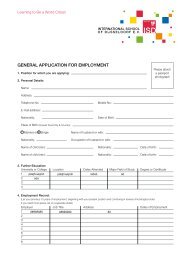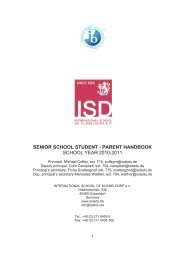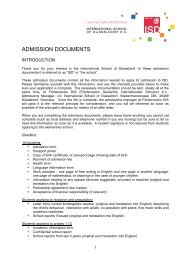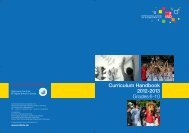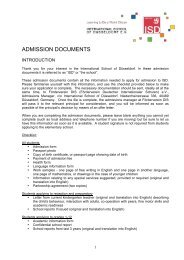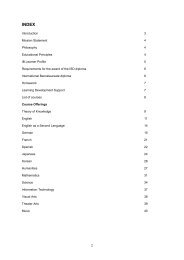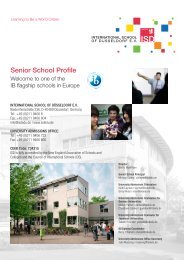Design Technology - International School of Duesseldorf
Design Technology - International School of Duesseldorf
Design Technology - International School of Duesseldorf
Create successful ePaper yourself
Turn your PDF publications into a flip-book with our unique Google optimized e-Paper software.
• Ecology<br />
Ecosystems and physical variables, food chains and webs, energy flow, the<br />
carbon cycle, field techniques<br />
• Variation and evolution<br />
Classification, variation, natural selection and evolution, biodiversity and<br />
conservation<br />
Chemistry/Physics<br />
The Chemistry/Physics course is an integrated course <strong>of</strong> combined chemistry and<br />
physics topics set in context based on a common science theme <strong>of</strong> energy. The<br />
environments area <strong>of</strong> interaction runs as a common thread through all topics<br />
including; energy conservation, pollution, waste disposal.<br />
The topics are:<br />
• Energy from fossil fuels<br />
Hydrocarbons, combustion and bond energy, processing crude oil, thermal<br />
power stations, electromagnetic induction and ac generators<br />
• Energy from nuclear reactions, wind and water<br />
The atom and nuclear fission, nuclear power stations, wind turbines, potential<br />
and kinetic energy, hydroelectric power stations, wave and tidal turbines<br />
• Energy from cells<br />
Chemical cells, the electrochemical series, hydrogen fuel cells, solar cells,<br />
semiconductors and the p-n junction diode<br />
• Transporting electrical energy<br />
Transformers, high voltage transmission lines, efficiency and power loss<br />
• Energy in industry<br />
Metal reactions and extraction, iron and steel making, copper purification,<br />
aluminium electrolysis, plastics and polymerization<br />
• Energy in the home<br />
Paying for electricity, circuit breakers and electromagnets, electric motors,<br />
heating and lighting, fluorescent tubes and filament lamps<br />
• Energy in transport<br />
Petrol and electric driven cars, car lighting and LED’s, safety features, air bags<br />
and crumple zones, stopping distances<br />
ASSESSMENT<br />
There are six broad assessment criteria for MYP science and for each criterion<br />
students are assessed against a set <strong>of</strong> agreed, grade-specific learner outcomes.<br />
The criteria are:<br />
One World, an appreciation <strong>of</strong> science and how it relates to society,<br />
Communication in Science, including written and oral aspects as well as the use <strong>of</strong><br />
various media,<br />
Knowledge and Understanding <strong>of</strong> Science including laws, theories concepts,<br />
problem solving, analysis and evaluation (and terminology),<br />
Scientific Inquiry including the ability to formulate a hypothesis, decide on<br />
appropriate variables and critically evaluate an experiment,<br />
Processing Data including the use <strong>of</strong> graphs and mathematical analysis and the<br />
ability to make predictions and draw conclusions based on data, and<br />
Attitudes in Science which includes working safely and responsibly and<br />
collaborating with other students.<br />
36



